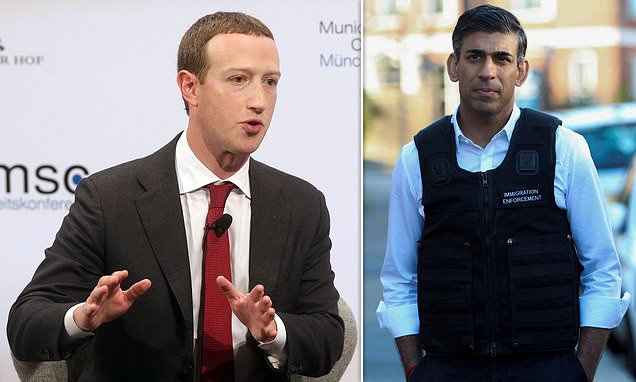Bank bosses tell Rishi Sunak social media firms like Meta should pay more in online fraud battle

- Chiefs of UK banks like Barclays warned PM the UK a ‘global hotspot for fraud’
- They said social firms like Facebook should repay fraud victims if their site used
Bosses of Britain’s biggest banks have told the Prime Minister that technology firms such as Meta should pay more in the battle to combat the ‘pandemic’ of online fraud that costs consumers £1.2billion a year.
Rishi Sunak was sent a letter signed by the chief executives of nine financial institutions, including Barclays, NatWest and Nationwide, warning him that the UK is now a ‘global hotspot for fraud and scams’.
They accused the government’s new National Fraud Strategy, which was revealed last month, of not be strong enough to fight back against fraudsters.
The finance bosses said that scammers stole £2,300 stolen from British consumers every day last year – and noted a UK Finance report which concluded that £1.2billion was lost to fraud of all kinds in 2022.
The banks also warned that they could take further action to ‘protect’ their customers if the government do not intervene to a larger degree.
Measures could include slowing down payment speeds, which they said was a ‘useful but blunt instrument’ as it would mean consumers and businesses will see completely legal transactions being delayed, according to the letter seen by Sky.
The letter, which was sent on June 6, told Rishi Sunak that online fraud is a ‘strategic threat’ to economic prosperity in the UK and that it undermines the economy and the financial sector.
Many frauds start with contact being made on social media platforms, such as Facebook, Instagram and WhatsApp, which are under the umbrella of Mark Zuckerberg’s Meta.
And banks now want technology firms to be accountable for stopping these at the earliest opportunity, and contribute to the refunds owed to victims of fraud where the scam used their platform.
They have also called for a public register which shows how the tech giants fail to prevent these scams.
The banking boss’s letter to Rishi Sunak reveals their frustration that companies such as Meta do not bear much of the financial risk for fraud.
Bank TSB wrote to Meta this week demanding that they better moderate social media operations. And their chief executive, Robin Bulloch, was among the people who signed the letter to the PM.
Other people who signed the letter include NatWest CEO Dame Alison Rose, Nationwide chief executive Debbie Crosby, Lloyds Bank Group’s Charlie Nunn, HSBC boss Ian Stuart, Barclays UK chief Matt Hammerstein, Santander UK CEO Mike Regnier, Handelsbanken boss MIkael Sorensen and the outgoing CEO of Starling Bank Anne Boden.
Also signing it were the chairman and chief executive of banking lobby group UK Finance, Bob Wigley and David Postings respectively.
They said that most scams that target British people start out through the use of a a limited few technology, social media and telecoms companies.
The banks also complained that the Financial Ombudsman Service places a disproportionate burden on the banking industry, and little to none on other sectors which contribute to fraud figures.
They urged the PM to make voluntary measures for telecoms and technology sectors designed to clamp down on fraud mandatory – adding that they should be made to inform consumers on digital security risks.





